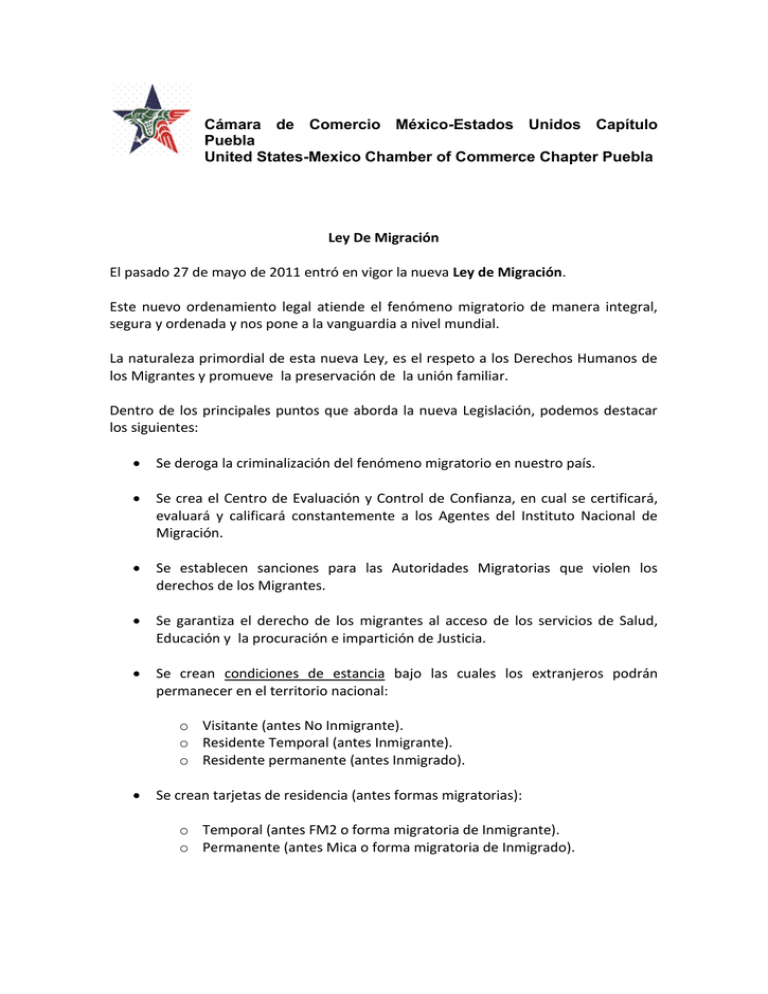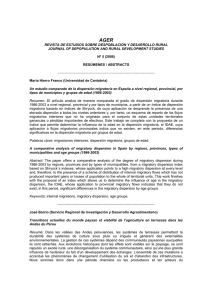Cámara de Comercio México-Estados Unidos ... Puebla United States-Mexico Chamber of Commerce Chapter Puebla
Anuncio

Cámara de Comercio México-Estados Unidos Capítulo Puebla United States-Mexico Chamber of Commerce Chapter Puebla Ley De Migración El pasado 27 de mayo de 2011 entró en vigor la nueva Ley de Migración. Este nuevo ordenamiento legal atiende el fenómeno migratorio de manera integral, segura y ordenada y nos pone a la vanguardia a nivel mundial. La naturaleza primordial de esta nueva Ley, es el respeto a los Derechos Humanos de los Migrantes y promueve la preservación de la unión familiar. Dentro de los principales puntos que aborda la nueva Legislación, podemos destacar los siguientes: Se deroga la criminalización del fenómeno migratorio en nuestro país. Se crea el Centro de Evaluación y Control de Confianza, en cual se certificará, evaluará y calificará constantemente a los Agentes del Instituto Nacional de Migración. Se establecen sanciones para las Autoridades Migratorias que violen los derechos de los Migrantes. Se garantiza el derecho de los migrantes al acceso de los servicios de Salud, Educación y la procuración e impartición de Justicia. Se crean condiciones de estancia bajo las cuales los extranjeros podrán permanecer en el territorio nacional: o Visitante (antes No Inmigrante). o Residente Temporal (antes Inmigrante). o Residente permanente (antes Inmigrado). Se crean tarjetas de residencia (antes formas migratorias): o Temporal (antes FM2 o forma migratoria de Inmigrante). o Permanente (antes Mica o forma migratoria de Inmigrado). Se crea la obligatoriedad de los extranjeros que se encuentren en el país bajo la condición de estancia de Residente temporal, a conservar dicha condición de estancia por un período de al menos 4 años. Se crea el Sistema de Puntos, éste sistema implementará las reglas y requisitos para que los extranjeros puedan adquirir la Residencia permanente, sin cumplir con los cuatro años de Residencia temporal a los que tienen derecho y están obligados. Y en general se establecen nuevos derechos y obligaciones de los extranjeros. Denise Mettey Cámara de Comercio México-Estados Unidos Capítulo Puebla 31 Poniente 4128 Piso 9 A. Col. Ampliación Reforma. C.P. 72160 Tel. 52(222)403-29-08 Fax. 52(222)249-23-61 [email protected] Immigration Law On May 27th a new Immigration Law went into effect. This new legal rule regulates the migratory phenomenon in an integral, reliable and orderly way and places Mexico in the forefront on an international level. The main focus of this new Law is the respect for the Human Rights of Migrants and the promotion of the preservation of the family union. We would like to point out some of the principal points this new legislation tackles: The criminalization of the migratory phenomenon in Mexico is annulled. The Center of Evaluation and Confidence Control is created, which will certify, evaluate and qualify the Agents of the National Institute of Migration on a constant basis. Sanctions are established for Migratory Authorities who violate the Migrants’ rights. Migrants will have the right to Healthcare, Public Education and due process in the Mexican legal system. Conditions of stay are created under which foreigners can remain on national territory: ° Visitor (previously called Non-immigrating status) ° Temporary resident (previously called Immigrating status) ° Permanent resident (previously called Immigrated status). Residence cards are created (previously called migratory forms): ° Temporary (previously called FM2 or migratory form for Immigrating) ° Permanent (previously called Mica or migratory form for Immigrated) Foreigners who are in the country under the status of Temporary Residents are under the obligation to maintain this condition of stay for a period of at least 4 years. A Point System is created which will implement rules and requirements in order for foreigners to obtain the Permanent Residency without having to complete the 4 years of temporary residency to which they are entitled and are under the obligation. In general new rights and obligations for foreigners are established.
